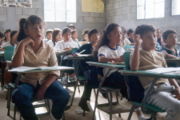Education
|
Ignorance is a contributing factor in many of the problems we face today, such as AIDS, pollution and food production. A first-rate education for the citizenry synergizes
 with every other element of an advanced civilization: scientific discovery happens faster, open collaborative projects grow faster and at a better quality, public health improves, solutions to our problems come faster and ambitious projects like colonising space or curing cancer become more and more feasible. with every other element of an advanced civilization: scientific discovery happens faster, open collaborative projects grow faster and at a better quality, public health improves, solutions to our problems come faster and ambitious projects like colonising space or curing cancer become more and more feasible.
There is no reason whatsoever for education to be a scarce resource. Education is a resource of information, rather than of physical goods, and reproducing information is free. In a world of universal connectivity, education can be ubiquitous if it is made freely available online. This is a task for open collaboration. It is no secret that the schooling system nowadays is in a crisis. Our schools are based on a factory-line model: a child goes in one end, is processed according to a standard procedure and comes out the other end with a certificate. No regard is paid to the person's interests, curiosity, creativity, passion. Students are taught outdated material from a peculiar selection of often irrelevant or downright boring subjects. Their flexibility and capacity to deal with unexpected, non-obvious solutions are not encouraged, and are often actively suppressed. They are not free to pursue their passions and talents. They are not given the chance to apply their skills in any practical way. And worst of all, most students simply hate school. (One study [1] found that only 10-33% of students report being satisfied with school. The same study found that most students feel their teachers are uninterested in supporting them.) How can we promote better education? The answer seems simple: make learning truly interesting, more relevant to the individual and make proper use of modern media. An inflexible curriculum only benefits the schools and assessment bodies. It is becoming ever easier to create interactive 3-D environments such as those found in advanced computer games. With the right scripting for interaction and behaviour, these can make a captivating experience where the student hardly realises they are learning. It is a crime for education not to be interesting! Luckily, for every module of every subject there are educators (and others) who are truly gifted at explaining and teaching key concepts. We must make better use of these people in conjunction with open collaboration and the latest technology to disseminate knowledge to all who wish to learn, wherever they might be in the world.
Educational material can be created and edited collaboratively, constantly evolving and increasing in both quantity and quality, similar to the evolution of the famous wikipedia Such material is made available free for anyone — teachers or students — to use and customise for their own purposes. This project is in early days, but is very much under way already. Listed below are several sites
Stanford University are running an experimental new course from October-December 2011. It is an introductory college course in artificial intelligence, led by Peter Norvig and Sebastian Thrun (a leading developer of self-driving cars). The course is available to all free of charge and combines video lectures with online quizzes and assessments. As of August 2011, over 130,000 people have signed up. In the coming years, courses like this are sure become become more interactive and multiply to cover a greater range of subjects.
Some skills -- such as walking, riding a bicycle, putting a basketball in the hoop, and swimming -- are most rapidly learned by actually doing it, perhaps with someone who already knows how to do it putting your hands in the right place, etc. Other skills -- such as skyscraper design, aircraft engine-out recovery, parachuting, leading troops into battle, urban planning, etc. -- are generally considered not appropriate for beginners. These skills are today generally learned with a bunch of classroom lectures and simulation. For example, modern flight simulators have a combination of computer graphics (simulating the view out the front window) and robotics (moving the simulator round to simulate the "feel" of climbing, spiraling, rough landing, etc.). Improvements in computer graphics and robotics can improve education in several ways, including:
See also:
Free and open-source computer-aided design/Virtual environments for scenario modelling.
World Game |
 [print version]
[print version]  [update]
[update]  [site map]
[site map]